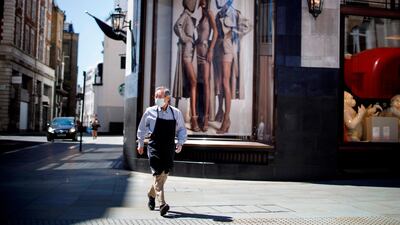The retail sector will rebound in the middle of this year with spending driven by £100 billion ($137.31bn) in excess savings consumers have built up during lockdowns, according to global consultancy PwC.
However, increased unemployment as the furlough scheme ends will drag on consumer spending overall, while the expiry of the stamp duty holiday on March 31, falling birth rates and immigration levels will have a downward effect long term.
Nick Forrest, director of economics and policy at PwC, said the first quarter of this year would be very challenging for retailers and the wider economy, however, the release of savings from the second quarter will help the economy rebound strongly.
“We do see quite a strong recovery as we get the vaccination programme through,” Mr Forrest told a virtual briefing on Thursday.
“We're going to live in a quite a strange world with people who have had Covid, people who have had the vaccine and people who haven't and people still concerned and isolating … so, for politicians and retailers, navigating to different segments of people throughout the next few months will be quite a challenge.”
Mr Forrest said the recovery might tail off in the longer term as challenges around unemployment and businesses that have been disrupted start to manifest. “The last part of recovery will take a little bit longer after that initial strong period,” he said.
Consumer spending will surge this summer, driven by a £100bn build-up in savings for individuals whose incomes have been unaffected by the cycle of lockdowns, with the recovery phase also boosted by low interest rates.
However, this will be offset by the end of the government’s furlough scheme, which is expected to drive up unemployment.
“The government will try and make that gradual and limit the impact on employment but it's inevitable we're going to see more unemployment and that will be a drag on consumer spending,” said Mr Forrest.
Another drag factor will come from the falling birth rate and lower immigration levels from the EU. According to the Economic Statistics Centre of Excellence, an "unprecedented exodus" from the UK of foreign workers during the pandemic contributed to a 1.3 million fall in the population between the third quarter of 2019 and the same period in 2020.
Meanwhile, 58 per cent of those planning a child delayed trying for a baby during the crisis, according to a PwC study.
“We are now nine months on from the first lockdown, so we might start to see the impact on the birth rate through this year and it’s possible the birth rate might be at the lowest point in the last 100 years, which will have an impact on certain segments such as the retail market," Mr Forrest said.

British retailers suffered their worst annual performance on record in 2020, as the series of lockdowns took its toll on fashion and homeware sales.
The sector suffered an overall fall in sales of 0.3 per cent on the year, according to the British Retail Consortium-KPMG retail sales monitor, with the typically bumper Christmas period offering little respite for high street stores.
Some of Britain's largest retailers closed last year, with department store Debenhams shutting up shop in December and retail tycoon Philip Green's Arcadia fashion group entering administration.
Despite Covid restrictions in December that forced non-essential shops to shut for part of the month, UK inflation rose to 0.6 per cent as consumer prices jumped from a 0.3 per cent annual increase in November, driven higher by transport and clothing costs.
Mr Forrest said inflation will rise to 1.5 per cent this year, but there will not be runaway spending because the coronavirus outbreak has not been an inflationary crisis but a “crisis of economic activity”.
While 30 per cent of consumers do not expect life to return to normal until autumn, PwC said, one of the biggest shifts experienced last year was the retail sector’s acceleration to online.
The sector experienced seven years’ of online growth in seven weeks at the start of the Covid-crisis, according to Lisa Hooker, PwC's leader of industry for consumer markets, which enabled retail to fare better than most industries in terms of gross domestic product last year.
While footfall was "decimated" in the first lockdown and currently sits about minus 77 per cent, online retail “saved the day” and “rescued” what could have been an even worse year, Ms Hooker said.


